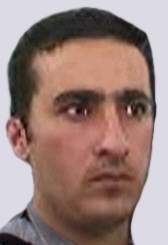
The State Department announced on Dec. 22 that a reward of up to $10 million is being offered for any information leading to the capture of an Iran-based al Qaeda financier named Ezedin Abdel Aziz Khalil, also known as Yasin al Suri. In July, the Treasury Department added al Suri and five other al Qaeda terrorists to its list of specially designated terrorists. [See LWJ report, Treasury targets Iran’s ‘secret deal’ with al Qaeda.]
The six designated al Qaeda operatives have used Iranian soil to funnel funds and terrorists throughout the Middle East. They have done so as part of “an agreement between al Qaeda and the Iranian government,” according to Treasury.
One of the six, Atiyah Abd al Rahman, was subsequently killed in a US drone strike in August. According to Treasury, Osama bin Laden appointed Rahman as al Qaeda’s “emissary in Iran, a position which allowed him to travel in and out of Iran with the permission of Iranian officials.”
The addition of al Suri to the Rewards for Justice Program is the first time that a reward has been offered for information leading to the capture of a terrorist financier, according to the US government officials who briefed the press.
“Under an agreement between al Qaeda and the Government of Iran, Yasin al Suri has helped move money and recruits through Iran to al Qaeda leaders in neighboring countries in the region,” Robert Hartung, the State Department Assistant Director for Threat Investigations and Analysis, explained during the briefing.
“From his sanctuary inside Iran, he has moved terrorist recruits through Iran to al Qaeda leaders in Pakistan and in Afghanistan,” Hartung added. “He has also arranged for the release of al Qaeda operatives from Iranian prisons and their transfer to Pakistan. And he has funneled significant amounts of money through Iran to al Qaeda’s leadership in Afghanistan and Iraq. He is a dedicated terrorist working in support of al Qaeda with the support of the Government of Iran, which the Department of State has designated a state sponsor of terrorism.”
The Treasury Department’s Assistant Director of Terrorism and Financial Intelligence, Eytan Fisch, also spoke at the briefing. Fisch described al Suri as a “senior al Qaeda facilitator” whom Iranian authorities have allowed “to operate within Iran’s borders since 2005.”
“Al Suri’s network has served as a financial conduit, collecting funds from donors throughout the Gulf and moving those funds via Iran to al Qaeda’s leadership in Afghanistan and Iraq,” Fisch added. “Al Suri’s network also serves as the core pipeline for al Qaeda to funnel operatives and facilitators from the Middle East to Afghanistan and Pakistan.”
It was not clear from the briefing where in Iran US officials suspect al Suri is based, or if he moves around the country. But according to an analysis prepared by the NEFA Foundation in 2009, Pakistani intelligence reports indicate that al Suri is based in Zahedan, Iran. As the capital of Iran’s Sistan and Baluchestan province, Zahedan sits on the border with both Pakistan and Afghanistan — an ideal location for smuggling al Qaeda operatives to other parts of the terror network.
In May, a Guantanamo detainee known as Inayatullah committed suicide while still in custody. Inayatullah, according to the Department of Defense, admitted to authorities that he was al Qaeda’s emir of Zahedan. Like al Suri, the US government claimed that Inayatullah shuttled operatives to Iran’s neighboring countries.
Inayatullah also allegedly worked with senior al Qaeda operatives, including Abu Ubaydah al Masri, who was involved in both the July 7, 2005 bombings in London and the thwarted plot to bomb jetliners leaving Heathrow Airport in 2006. Masri died from natural causes in 2008.
It is not publicly known if Inayatullah worked with al Suri, but it is certainly possible given their similar roles inside Iran.
The NEFA analysis indicates that al Qaeda recruits from Europe were encouraged to use Zahedan and another city in Iran, Mashhad. “In a January 2007 speech to his cadre,” the NEFA analysis reads, “Osama bin Laden noted that numerous recruits who tried to enter through Pakistan were arrested, so he urged his cadre to open up new travel routes.” The slain al Qaeda master “asked them to reroute the track in Iran to Mashhad and from there cross the border with Afghanistan.”
Like Zahedan, Mashhad has long been used by al Qaeda operatives traveling to Afghanistan, Pakistan, and elsewhere. The deputy leader of al Qaeda in the Arabian Peninsula, Said al Shihri, was previously a key al Qaeda facilitator based in Mashhad. [See LWJ report, Return to Jihad.]
Iran has on occasion detained select al Qaeda operatives. Some senior al Qaeda leaders have also been held in a loose form of house arrest, only to be freed over time. Still others, like al Suri, have been allowed to operate with the Iranian regime’s approval.








2 Comments
This Iranian link and support of Al Qaeda should bring world condemnation, but of course it will not. “Moderate” Islam will remain quite and the West is simply resigned to these facts. My question is one I have pondered for years…despite the extreme (violent..murderous…) Shia/Sunni divide, just how much cooperation is there between Shia Hezbollah, Iranian Quds and the extensive Sunni Al Qaeda network?
As long as people like aka Yasin al Suri keep targeting their fellow Muslims & ‘representative’ governments they should be encouraged.